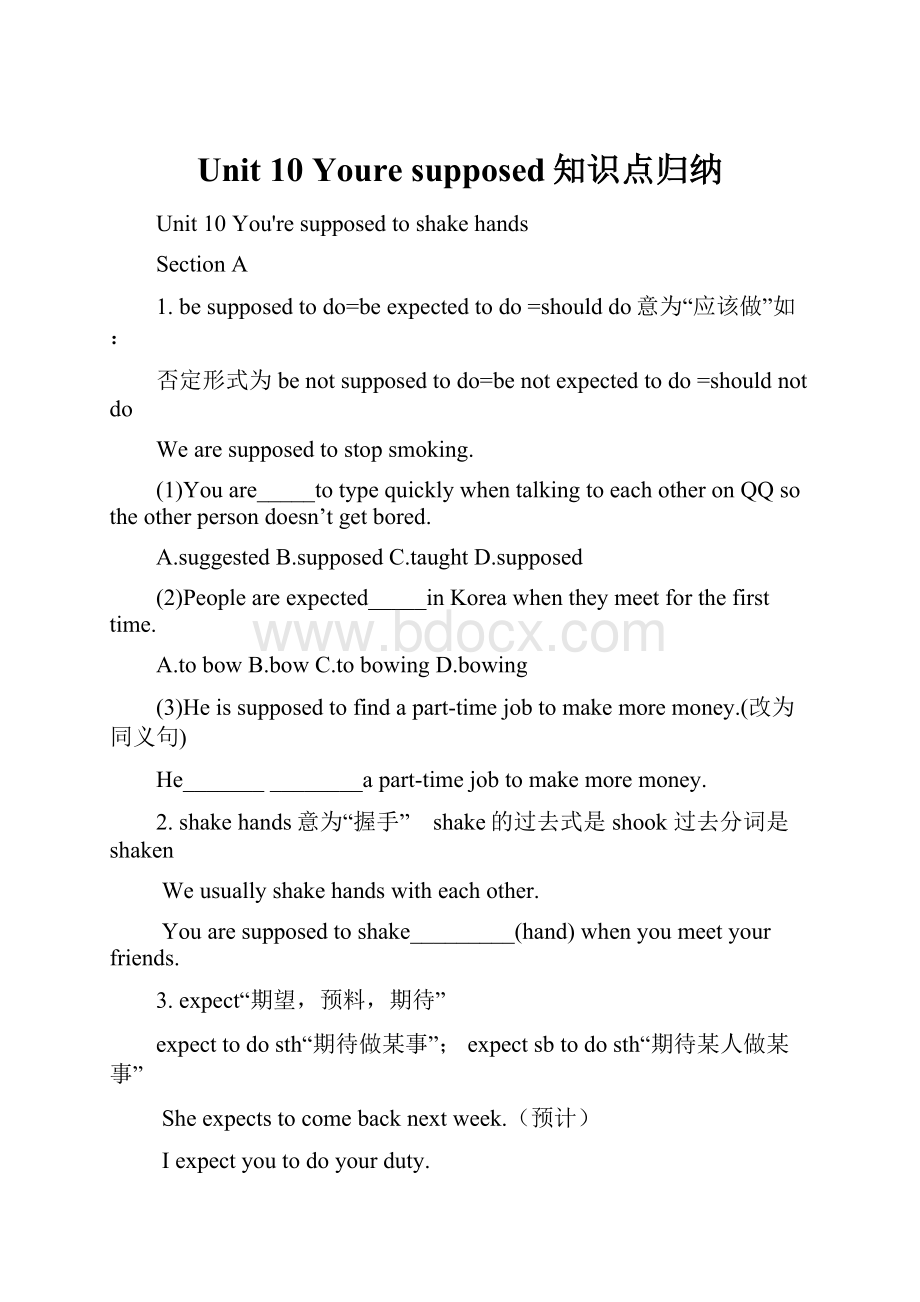Unit 10 Youre supposed知识点归纳.docx
《Unit 10 Youre supposed知识点归纳.docx》由会员分享,可在线阅读,更多相关《Unit 10 Youre supposed知识点归纳.docx(15页珍藏版)》请在冰豆网上搜索。

Unit10Youresupposed知识点归纳
Unit10You'resupposedtoshakehands
SectionA
1.besupposedtodo=beexpectedtodo=shoulddo意为“应该做”如:
否定形式为benotsupposedtodo=benotexpectedtodo=shouldnotdo
Wearesupposedtostopsmoking.
(1)Youare_____totypequicklywhentalkingtoeachotheronQQsotheotherpersondoesn’tgetbored.
A.suggestedB.supposedC.taughtD.supposed
(2)Peopleareexpected_____inKoreawhentheymeetforthefirsttime.
A.tobowB.bowC.tobowingD.bowing
(3)Heissupposedtofindapart-timejobtomakemoremoney.(改为同义句)
He_______________apart-timejobtomakemoremoney.
2.shakehands意为“握手” shake的过去式是shook过去分词是shaken
Weusuallyshakehandswitheachother.
Youaresupposedtoshake_________(hand)whenyoumeetyourfriends.
3.expect“期望,预料,期待”
expecttodosth“期待做某事”;expectsbtodosth“期待某人做某事”
Sheexpectstocomebacknextweek.(预计)
Iexpectyoutodoyourduty.
4.在英语中,有三个词可以表示“到达”,但用法不同
(1)arrive是不及物动词,后面需接介词at或in,再和表示地点的名词连
用.arriveat常跟一个较小的地方;arrivein常跟一个较大的地方.
Hearrivedatthevillageat7:
30.IwillarriveinBeijingtomorrow.
(2)reach是及物动词,后面直接跟宾语
IwillringyouassoonasIreachBeijing.我一到北京就给你打电话
(3)get是不及物动词,后面需加介词to,再跟表示地点的名词.
PleasewritetouswhenyougettoBeijing.
注意:
get和arrive后跟表地点的副词时,则不需接介词.
Myfatheroftengetshomeearly.我父亲经常回家早.
5.inthemorning.在早上,onthemorningofMay1st.在5月1日早上。
—WhendidtheterribleearthquakehappeninYa’anSichuan?
—Ithappened_____8:
02_____themorningofApril20th,2013.
A.on;inB.at;onC.at;inD.on;on
6.makefriendswithsb意为“与某人交朋友”
IfinditdifficulttomakefriendswithJim.
7.fun是不可数名词。
What(great)funitis!
8.happen的用法
(1)sth+happened+地点/时间“某地/某时发生了什么事”
Afunnythinghappenedinthesubwayyesterday.
(2)sth+happenedtosb“某人出了某事”
Acaraccidenthappenedtoherthismorning.
(3)sb+happenedtodosth“某人碰巧做某事”
Ihappenedtomeetafriendofmineinthestreetyesterday.
(1)What_____whileLindawasonherwaytoNewYork?
A.happenedB.didhappenC.washappenD.happens
(2)Hedidn’tknowwhatwas(发生)outside.
9.
(1)happen意为“发生”不用于被动语态,一般用于偶然或突发性事件;
sthhappentosb“某人发生了什么”
Unluckily,aterriblethinghappenedtohim.
(2)takeplace一般指非偶然性事件的“发生”,即这种事情的发生一定有某种
原因或事先的安排。
Maybesomethingunexpectedhappened.
Greatchangeshavetakenplaceinourhometownduringthepasttenyears.
(1)Therearemanypeopledownstairs.Whatdoyouthink?
A.tohappenB.happeningC.ishappenedD.hashappened
(2)WhattoCarlalastnight?
Whatdidshecryfor?
A.washappenedB.happenedC.washappeningD.hadhappened
(3)Theaccidenthimatthreethisafternoon.
A.happenedtoB.tookplacetoC.washappeningtoD.wastakenplaceto
10.记住几表示“最后”的短语
(1)intheend=atlast=finally(intheend后面没词)
Intheendtheyreachedaplaceofsafety.
(2)attheendof…意为“在…的最后”(attheendof后面必须有词)
attheendoftheroad.在路的尽头attheendoftheclass.在这节课的结尾
Attheendofthestreetyou’llfindit.
_____theend,theyfoundasupermarket______theendoftheroad
A.At;in B.In;at C.In;by D.By;at
11.thesameas意为“与……同样的”,反义词组是bedifferentfrom“和……不一样”
Mike’scousinisthesameage________him.Theygetonwell________eachother.
A.for;inB.for;withC.as;inD.as;with
12.
(1)surprised意为“感到惊讶的”,常用来说明人的感受。
surprising意为“令人惊讶的”,常用来说明事物。
Surprisingnewsalwayssurprisesus.Thatistosay,wearesurprisedatsurprisingnews.
(2)常用搭配:
surprisesb“使某人惊讶”Whatyousaidsurprisesme.
toone’ssurprise“令某人感到吃惊的是”
Tomysurprise,shegotaperfectscoreintheEnglishexam.
besurprisedat“对……感到惊讶”Weareverysurprisedatthenews.
besurprisedtodosth“做某事感到惊奇”Iwassurprisedtoseeyouhere.
(1)ToKevin’s,hefoundsomanypeopleplayingbeachvolleyballinveryhotweather.
A.surprisedB.surpriseC.surprisingD.tosurprise
(2)—Whynottellherthegoodnewsrightnow?
—Oh,no.Iwantto________her.
A.surpriseB.callC.findD.help
13.区分lookfor,find和findout
(1)lookfor意为“寻找”,强调寻找的动作和过程。
Ican’tfindmypen.I’mlookingforiteverywhere.
(2)find动词,意为“找到”,强调找到这一结果
Ilooked,butIdidn’tfindit.
(3)findout意为“查明,了解(常指弄明白事情的真相)”
Pleasefindoutwhenthetrainleaves.
(1)Whereismynotebook?
Ican’tit.
A.needB.helpC.findD.learn
(2)Canyouwhohaslostthewatch?
A.findB.lookupC.lookforD.findout
(4)Thewindowwasbroken.Tryto_____whohasbrokenit.
A.findB.lookC.findoutD.lookfor
14.berelaxedaboutsth. 意为“对某事随意、不严格” 如:
Theyarerelaxedaboutthetime.他们对时间很随意。
15.辨析:
relaxed和relaxing
(1)relaxed“放松的,感到放松的”,常作表语,主语通常是人。
(2)relaxing“令人放松的”,可作表语或定语,常用于修饰物。
Ifeelreallyrelaxedaftertherelaxingvacation.
16.abit和alittle
(1)abit,alittle在肯定句中修饰动词、形容词、副词及其比较级时,可以互换,意为“一点儿”
Thestudentsfeelabit/alittletiredafterrunning.跑步之后,学生们感到有点儿累。
(2)abit和alittle在否定句中意思恰恰相反.notabit=notatall“一点儿也不”
notalittle=verymuch“非常”
Hewasn’tabitangry.他一点也不生气.
Hewasn’talittleangry.他非常生气.
(3)alittle可直接修饰不可数名词,abitof修饰不可数名词.
Thereisalittlemeatinthefridge.=Thereisabitofmeatinthefridge.冰箱里有一些肉.alittlewater=abitofwater.一点水
17.spendtimewithsb意为“和某人一起度过时光”
Heusuallyspendstimewithhischildrenonweekends.
18.dropby意为“顺便拜访”,后接某人或某地。
dropinon意为“顺便访问某人”
Ijustdropbyyou.
Wouldyoudropinonusthiseveningforachat?
Heoftendrops_____hisfriends’homes.
A.forB.byC.aboutD.on
19.makeplanstodo=makeaplantodo=plantodo.打算做某事 如:
ShehasmadeplanstogotoBeijing.==ShehasplanedtogotoBeijing.
20.as……aspossible=as……asonecan/could.意为“尽可能……地”,as……as之间必须是形容词或副词的原级。
也可以是名词。
Thatmanranhomeasfastashecould.=Thatmanranhomeasfastaspossible.尽可能快地Youmusttrytorememberasmanywordsasyoucan.
asmuchaspossible意为“尽可能多地”WeshouldpracticeEnglishasmuchaspossible.
Thevolunteerspokeas_____asshecouldtomakethevisitorsunderstandher.
A.clearlyB.moreclearlyC.moreclearlyD.themostclearly
21.ontime意为“准时,按时”;intime表示“及时”,attimes=sometimes有时atthesametime同时allthetime“一直,总是”bythetime“直到……时候;到……之前”
Pleasedon’tbelate.Comehereontime.
Themanwasjustintimefortheplane.
AttimesImakemistakeswhenIspeakEnglish.
Thetwinsalwaysgotobedatthesametime.
Kittyworkshardallthetime.
Bythetimewegottothecinema,thefilmhadbegun.
Don’tworry,Westillhavetenminutestoreachthere.
A.attimesB.bythetimeC.allthetimeD.ontime
22.afterall“毕竟;终究”
Shedoesn'tunderstand,Afterall,sheisonlyachild.
23.atnoon“在中午”
Heusuallycallsmeupatnoon.
24.be/getmadat/withsb=be/getangrywithsb意为“生某人的气”
be/getmadaboutsth意为“因某事而生气”。
Pleasedon’tbemadwithme.
She’smadatmeforbeinglate.
We’reallmadaboutthenoise.
25.makeanefforttodosth意为“努力做某事”
Pleasemakeanefforttofinishitontime.
26.avoiddoingsth意为“避免做某事”
Itriedtoavoidmeetingherbacauseshealwaysboredme.
27.
(1)keep+sth+形容词,意为“保持某物是什么样的”
keeptheroomclean保持教室是干净的
(2)keepdoingsth意为“继续/反复做某事”Thepriceskeeprising.
(3)keepsbdoingsth.意为“让某人一直做某事”I’mverysorrytokeepyouwaiting.
(4)keepsbfromdoing意为“阻止某人做某事”
Wemuststophimfromdoingthisthing.
(1)Wemustkeeptheclassroom.
A.cleanB.tocleanC.cleaningD.cleaned
(2)Asweallknow,it’snotpolitetokeepothers_____foralongtime.
A.waitB.waitedC.towaitD.waiting
28.without介词,意为“没有”
Jimwenttoschoolwithouthavingbreakfastthismorning.
(1)Icouldn’tdoit_____yourgreathelp.
A.withB.withoutC.forD.to
(2)Without_____aword,themanleftinahurry.
A.sayingB.saysC.saidD.tosay
29.除了no,not以外的其他否定词有never(从不),nothing(没有什么),few(几
乎没有),little(几乎没有),hardly(几乎不),seldom(不常,很少)而unhappy
(不高兴的),uncrowded(不拥挤的),dislike(不喜欢)等不是否定词。
Shehasfewfriends,doesshe?
Yes,hedoes.
(1)JimnevergoestothemoviesonSaturday,?
A.doesJimB.doesn’tJimC.doesn’theD.doeshe
(2)—Howoftendoyougoskating?
—______.Ican’tskateatall.
A.AlwaysB.SometimesC.SeldomD.Never
30.cleanoff意为“把……擦掉”。
代词必须放中间。
cleanout把……内部彻底打扫干净cleanup打扫干净
Afterclass,studentsaresupposedtocleanthechalkofftheblackboard.把黑板上的粉笔字擦掉
Couldyou_____thedust____thepictures?
A.clean;offB.take;offC.turn;offD.cut;up
31.knockat/onthedoor.意为“敲门”;knockinto“与……相撞;
knockdown“撞倒”
Heknockedat/onthedoor,buttherewasnoanswer.
Thecarknockedintothetreelastnight.
Heknockeddowntheboy.
32.takeoff脱下(衣服);(飞机)起飞
(1)TheplanewillfromBeijingCapitalAirportandlandinLondon.
A.takeupB.takeoffC.takeawayD.takeout
(2)Yourshoesaretoodirty.You’dbetter_____.
A.putonthemB.putthemonC.takeoffthemD.takethemoff
33.worth形容词,意为“值得,有……价值(的)”,一般作表语,其后通常跟动词-ing形式或表示金钱的名词,其用法有:
(1)beworthdoing,意为“值得做”,句子的主语一般是的宾语。
Theplaceisworthvisiting.
(2)beworth+钱,意为“值多少钱”Thepictureisworth$30.
(3)beworth+名词,意为“值得……”Idon’tthinkit’sworthourwork.
我觉得这事不值得我们付出的劳动
34.twomorebooks=anothertwobooks还需要两本书
Weneedanotherfivedesks.=Weneedfivemoredesks.
35.区分theother,another和other
(1)theother指“两者中的另一个”,接可数名词单数。
常用短语:
one…the
other…意为两者中“一个……另一个”
Ihavetwopencils,oneisshort,theotherislong.
(2)another泛指三者或三者以上中的另一个,后接单数可数名词。
Theshirtistoosmallforme.Showmeanotherone,please.
(3)other意为“其他的”,后接可数名词复数。
otherstudents其他的学生
(4)some…others意为泛指“一些……另一些”
Somepeoplebelieveit,othersnot.
注意:
others=other+名词复数
(1)Hehastwosisters.Oneisadoctorand____isateacher.
A.anotherB.otherC.theotherD.One
(2)—Wouldyouliketohavecake?
—No,thanks.I’vehadtwo.That’senough.
A.otherB.othersC.anotherD.theother
SectionB
1.stick…into…意为“把……插入”
Don’tstickyourforkintoyourfood.
chopstick“筷子”是由chop(砍)+stick(棒)合成,通常用复数形式:
chopsticks
Weusuallyeatnoodleswithchopsticks.
2.empty作形容词,意为“空的”;作动词意为“排空,倒空”
Thisisanemptywinebottle.Pleaseemptythiscup.
(1